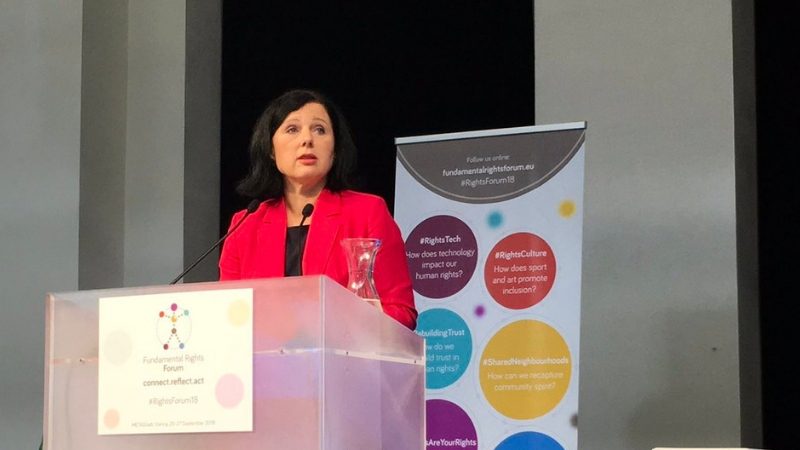EU Justice Commissioner Vera Jourová appealed to politicians to take responsibility for their words and show restraint as this could fuel fears, contributing to a rise of nationalism.
“They have to realise that their words become justification for some people to act on their urges and their fears,” she said on Tuesday at a Fundamental Rights Forum in Vienna.
In a democracy, irresponsible politicians could easily take advantage of the freedom of speech by using fear for their political gains.
The media was instrumental in holding politicians to account and defining what was considered to be unacceptable in society. “The murder of two brave journalists in the EU reminded us that it is a hard job. I was in Malta, where I visited the grave of Daphne Caruana Galizia, in the presence of her parents, husband, sisters and son,” Jourová said.
The media has a powerful role to play and “we should help them and defend their right to hold politicians to account,” the Justice Commissioner added.
Speaking about the challenges Europe was facing, Jourová said the “bad version” of nationalism was on the rise – one that promoted exclusion and hatred, together with abuse and discrimination. Online hate speech was also increasing.
These trends were not only visible in the rising popularity of extreme parties but, sadly, mainstream parties are also accepting part of this “rhetoric of division”.
Politicians have to realise that their words become justification for some people to act on their urges and their fears
The far-right march in Chemnitz, East Germany, the anti-Soros campaign in Hungary, making it illegal to offer to help to an immigrant claiming asylum and the growing anti-Muslim or anti-Roma rhetoric were just a few examples revealing there is a problem, Jourová said.
“Identity politics, based on exclusive nationalism, scares me. I lived in a totalitarian regime where there was only one right ideology, only one right government, and only one permitted discourse,” she said.
Minorities were non existent and diversity of views and opinions were not respected.
It means that exclusion, discrimination and lack of respect for minorities have spilled over from the margins to the centre and don’t meet enough resistance from the media, politicians or opinion leaders.
Jourová pointed out that exclusive nationalism tried to force people to define themselves against others, implying that being a part of majority “makes us somehow better”.
Fear was the predominant source as “when we are afraid, we often switch off rational thinking and escape to our instincts, even the darker ones”.
The way to fight this fear was not by ridiculing or lecturing or being ignorant as, instead of building a relationship, it would only push people away from the core principles. Instead, a familiar alternative had to be offered by promoting healthy patriotism based on inclusion while also nurturing the feeling of “familiar community”.












